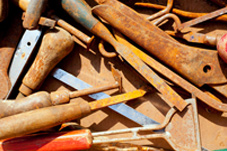
Tale of Rusty Tools
Hashem gives each of us a set of tools to do our designated tasks on earth. But, if we don't take care of them, they might become rusty or altogether ruined...

A magnificent King desired a new crown, far more exquisite than any other king’s crown ever crafted before. He therefore summoned the very best artisans in the kingdom – goldsmiths, silversmiths, gem polishers, and the leading jewelry designers and craftsmen.
The King built an entire village for the craftsmen whose sole task was to craft the King’s unprecedented and exquisite new crown. In addition to handsome salaries – far more than what each artisan had earned until now – the King gave each one his own luxury apartment in the village. The village had every imaginable amenity: there were gorgeous parks and walking paths, a tremendous swimming pool, game rooms, a gym and spa, tennis courts and whatever else the artisans enjoyed in their free time.
The artisans’ sole responsibility was to devote eight hours a day in the workroom, crafting the King’s crown. So that they’d be free to pursue their lofty task, the King staffed the village with an entire array of personnel –  cooks, valets, chambermaids, and other servants. The artisans had all their needs cared for, as others cooked, cleaned and laundered for them. They simply had to perform their designated task; after work, they could do whatever they pleased.
cooks, valets, chambermaids, and other servants. The artisans had all their needs cared for, as others cooked, cleaned and laundered for them. They simply had to perform their designated task; after work, they could do whatever they pleased.
The King ordered that the crown be crafted within one calendar year, more than ample time to get the job done. At that time, the craftsman would be recalled from the village to the Royal Palace where they’d present the King with his new crown.
At first, the artisans did their work in earnest. After eating a luxurious five-star breakfast at 8 AM, they’d report for work at 9 AM, work until 1 PM when they had a lunch break, and then again work from 2-6 PM. Gradually, the artisans spent more and more time at the breakfast table. They’d report to work fifteen minutes late. They’d stretch their lunch break from an hour to an hour and a half, and leave the workplace earlier and earlier every day.
As time went on, the artisans completely forgot their designated task. Their lives focused on the amenities – the swimming pool, the golf course, the dining hall and the tennis courts…
One day, the silversmith walked smugly into the dining hall at 8:50 AM, red-eyed from too much drinking and dancing the night before. He called to the waiter, “Bring me my breakfast! Smoked salmon and eggs, with croissants and Camembert…”
Disgusted, the waiter walked back into the kitchen. The cook was smoking a cigarette and the kitchen helpers were sipping coffee. “Tell him to get his own breakfast,” the cook snarled. “He and his snobby friends aren’t doing their job, so why should we be waiting on them?”
Soon, the entire village fell into utter disarray…
Months passed, and the King heard nothing from the village. He took his honor guard, and decided to pay the artisans a visit, to see how they were progressing with the crafting of the new crown.
Shocked, the King found the village gardens unkept and overgrown. The kitchen and dining hall were a mess, with soiled pots and dishes filling the sinks and strewn all over the floor. Worst of all, the workroom was empty. The world’s finest tools were rusty and all over the floor. Not a single artisan manned his work station.
Irate, the King summoned the royal foreman. “Where are all the artisans?” he bellowed.
“Your Majesty, they’re all scattered between the swimming pool, the golf course and the tennis courts.” When the King asked about the chaotic situation of the village, the foreman answered, “As they have not done their task at all, my staff and I have no will to serve them.”
* * *
What would you do if you were the King?
In effect, we are the artisans. The King is Hashem. He sends us to this “village” – the material world – to do our designated task. Every commandment we fulfill, every word of Torah we study and every utterance of prayer on this lowly earth creates another jewel in the Divine Crown.
In particular, Hashem gave us the wonderful tools of our reproductive organs. Our task is to bring the next generation into the world and to teach them to be upright people. Our tools also play an important role in marital gratification. yet, when these tools are used for anything other than our “royal task”, the nations of the world – the servants in the above allegory, automatically go against us.
The “Shovevim” period, the six weeks between the Torah portions of Shemot and Mishpatim, is an opportune time to enhance our personal holiness. Neither Hollywood nor anyone else in modern society can tell us what to do with the holy tools that the King entrusted us with. Marital fidelity and peace, modesty, and guarding one’s eyes all contribute to making a fabulous crown for the King of Kings, Hashem.
The sooner we crown Hashem, the sooner He’ll crown Mashiach in rebuilt Jerusalem, speedy and in our days, amen!








Tell us what you think!
Thank you for your comment!
It will be published after approval by the Editor.